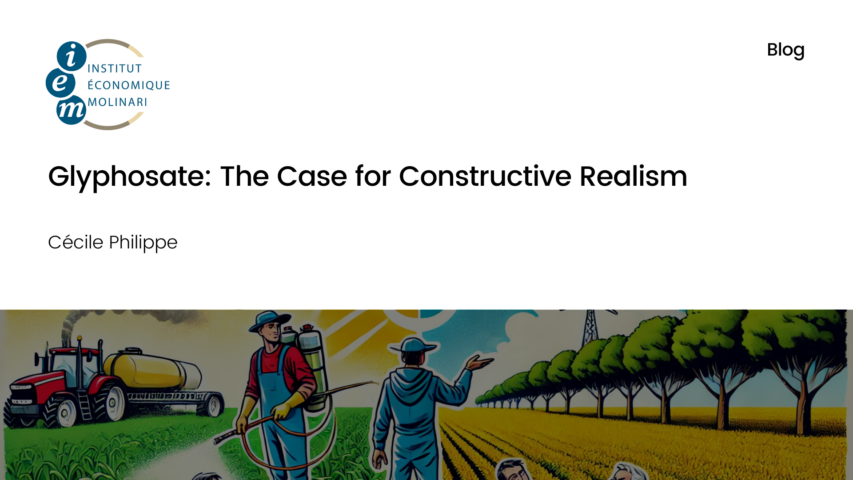Glyphosate: The Case for Constructive Realism

Glyphosate: The Case for Constructive Realism
Cécile Philippe // 29 November 2017
For a number of years now, the use of the glyphosate molecule as a herbicide has been controversial to the point that the member states of the EU could not reach an agreement about it until recently. Under a licensing protocol in the EU, its authorisation was up for renewal in June 2016. Due to the lack of a qualified majority when the Council vote took place, the Commission decided to extend its authorisation by 18 months. During the vote on November 9, there was still no majority, but on the 27 November with a surprise U-turn from Germany, EU member states decided to renew the license for glyphosate for another 5 years. President Macron pledged after the decision that France is still committed to phasing out the weed-killer.
In France, a glyphosate ban for personal usage is planned from 1 January 2019 and the government will try to ban it for all uses. However, this is not enough for Macron, who wanted to extend the ban to the rest of the EU. To do this, France’s leaders said they are only willing to accept an extension for the next three years, which they said would be sufficient to phase out usage of this product. The Minister for Ecological Transition, Nicolas Hulot, said he was “proud” that France had “held firm”. France was on 27th November one of nine countries to vote against the proposal to renew the glyphosate licence. A total 18 voted in favour of the licence with one abstention.
But should France hold firm? As with nuclear energy, is it possible and above all reasonable to remove glyphosate in such a short period of time?
Recently, former Environment Minister Brice Lalonde praised the more realistic programme of his successor in relation to nuclear energy. In essence, Nicolas Hulot announced at the beginning of November that the objective of reducing the share of nuclear energy to 50% of electricity production would be postponed. Hulot, the activist, could have chosen to resign in order to remain in line with his beliefs. He chose however to remain a Minister and to endure the criticism of the many commentators who accused him of backtracking and capitulating.
This was not necessarily an easy choice because we are all subject to the powerful influence of cognitive biases whereby the more one is invested in an idea, the more difficult it is to give it up. Undoubtedly, taking on the role of Minister forced Nicolas Hulot to take into account broader considerations. Considerations like the absence of cost-effective substitutes in the short term, the continued innovation and advancements in nuclear safety, and the impossibility of finding the perfect energy source.
It would seem sensible to adopt the same principle of realism when it comes to glyphosate. Because the questions that arise for glyphosate are the same as those that arise for nuclear, or for any other complex technology: What advantages does the product in question provide and at what price? Can we do without it? Are there substitutes? Do they offer superior comparative advantages?
The use of glyphosate removes weeds without ploughing. This has important environmental benefits as it maintains soil quality, moisture and carbon content. It has the beneficial effect of increasing earthworms and insects that contribute to drainage efficiency and biodiversity. All this without reducing yields, thus avoiding increasing land under cultivation. Organic farming, for its part, cannot do without ploughing. This is rarely mentioned in debates over the environmental sustainability of different forms of agriculture.
Today, glyphosate evokes controversy because in 2015, a study by the International Agency for Research on Cancer (IARC), which is a part of the World Health Organization (WHO), identified it as a probable carcinogenic risk. It has also categorised alcohol and processed meats as carcinogens. Will France’s wines and charcuterie be next on the list of products to ban?
Information published by Reuters last October has tainted the credibility of the IARC study. Meanwhile, the European Chemicals Agency (ECHA) concluded in March that the component should not be classified as a potential carcinogen. This echoes the position of many agencies, including the European Food Safety Agency (EFSA), which considers it an “unlikely” cancer risk, and the German Federal Institute for Risk Assessment, which, after evaluating 3,000 studies, judged that there is no evidence of toxicity to humans exposed to realistic doses.
Few are willing to give up the yields gained from a complex mix of fertilizers, pesticides, seeds, techniques, innovations, etc. Therefore, wanting to ban glyphosate means believing that there are substitutes that offer at least the same benefits overall in terms of yield, price, environmental benefits, health risks, etc. However, the debates do not deal sufficiently with this question: with what exactly are we going to substitute this product?
In this case, as in the case of nuclear energy, one must be realistic and stop believing that a perfect technique exists. There are only better or worse choices involving more or fewer costs. In the current state of the debate, it is no longer even possible to ask these questions calmly and to try to answer them constructively. This is undoubtedly what courage in politics is: knowing how to give up a narrow vision when necessary in order to embrace a broader vision that takes into account the complexity of today’s society. France should embrace such a vision, and stop opposing the renewal of glyphosate’s authorisation in the EU.
EPICENTER publications and contributions from our member think tanks are designed to promote the discussion of economic issues and the role of markets in solving economic and social problems. As with all EPICENTER publications, the views expressed here are those of the author and not EPICENTER or its member think tanks (which have no corporate view).



